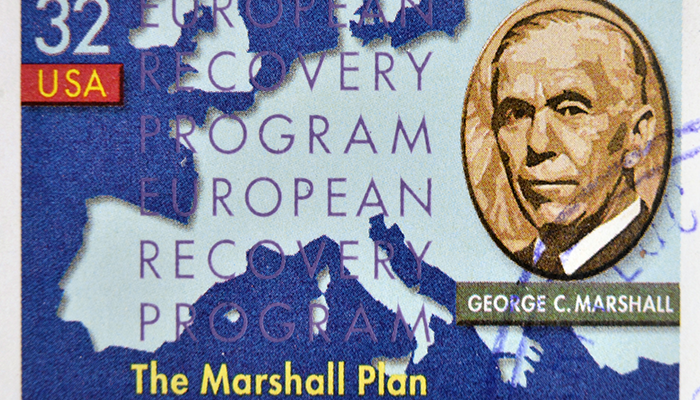web_marshall-plan_shutterstock_101724955.png

A 1997 stamp commemorating the Marshall Plan
The global economy is going into hibernation. It will be months - perhaps even years - before we can fight back from the looming depression. There will be no place to hide from the economic cold.
The emerging markets, already poor and with fragile institutions and weak healthcare systems, will be devastated by the pandemic. For the developed economies, the $2trn for the US emergency package is only the start of where government debt in OECD countries, already averaging 90% of GDP, will be heading. The debt increase will be exacerbated by tax revenues declining at all levels of government.
Quantitative easing is a short-term liquidity salve but it does not address the fundamental issue of how to jumpstart stalled or locked down economies, and then how to restore government balance sheets. It allows the monetisation of government debt and deficits, at the risk of boosting inflation. In the current conjuncture that is a risk worth taking.
Geopolitically, the world is much more divided than at any previous crisis since the Second World War. Even in 2007-8 the crisis was largely financial; the real economy everywhere was still in reasonable shape. Also, we had to, and the major powers did, act cooperatively in the wake of the crisis. China pulled the rest of the world out of the slump, while the North Atlantic economies slowly recovered. Now, even if China recovers partially through resurgent domestic demand, she will face huge declines in global demand.
This time round, we are facing a perfect storm with unprecedented health, economic, financial, social and geopolitical crises at the same time. Realistically, we can get ourselves out of this unique challenge only if there is global, concerted, Marshall Plan type action to address this set of challenges. But where to get the resources for such a plan?
“Putting the global economy on a war-like footing... could mobilise the public sector against the pandemic and also against the major challenges of climate change, homelessness and poverty”
Obviously, the IMF doesn’t have the financial resources to support every country but could help to organise a coordinated response to help turn idle assets into weapons in the fight for economic recovery. Just as we are now seeing retired doctors and nurses help out in the hospitals, along former airline workers and hotels converted into health care and welfare facilities, so we could see idle and underutilised public resources turned into productive assets.
A modern-day Marshall Plan could help mobilise the hidden assets that lie dormant even for governments that do not have a proper balance sheet, as is mostly the case. According to the IMF these assets, this Public Wealth, is worth twice global GDP. Professionally managed, these government assets could earn 3% of GDP in extra revenues each year and contribute significantly to the restoration of the economy. At least that was the assumption before Covid-19.
Putting the global economy on a war-like footing, as the US did during the Great Depression, could mobilise the public sector against the pandemic and also against the major challenges of climate change, homelessness and poverty. Public investments in improving health care would respond to a potential second wave of Covid-19 cases as well as any future pandemic. Similarly, investing in much-needed infrastructure and housing would assist economies to recover, and address acute social problems.
“This requires that we have comprehensive and accurate information about our financial situation in the public sector”
The aggregate demand for infrastructure investments, including the basic infrastructure to improve productivity and what is needed to achieve the Sustainable Development Goals, tackling poverty and climate change, as well as the investments needed to adapt to climate risks would be a Herculean task.
Any investment and construction that would add to aggregate demand for goods and services will be welcome, both to offset the economic consequences in the wake of the pandemic and to close the remaining infrastructure gap once the pandemic has been overcome.
However, just as accurate data from testing is critical in tackling the spread of Covid-19 - clearly demonstrated by South Korea - this requires that we have comprehensive and accurate information about our financial situation in the public sector. We especially need accurate information on all our sources of revenue and expenses, and detailed information about all the assets and liabilities on our balance sheets. This is necessary to be able to mobilise resources correctly, as well as to make informed investment decisions as to what is the most productive use of those resources.
If we know debt is increasing significantly and balance sheet strength is at risk of being seriously compromised, preparations must be made now to support the recovery globally. One step would be for the IMF and other international financial institutions to start now to include information on the public sector balance sheet in their regular monitoring and surveillance of economies (e.g. the IMF’s Article IV-Consultations).
For global challenges solidarity between countries needs to be as strong as unity within them. Organisations such as the IMF can promote that solidarity by coordinating the response governments will need to make to strengthen and rehabilitate their balance sheets. That could create the conditions needed to invest in the infrastructure that will be an important plank in re-establishing economic prosperity around the world and ensure we are better prepared to cope with the next crisis.














